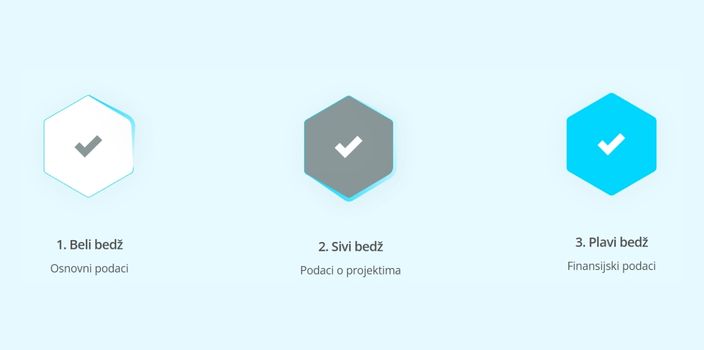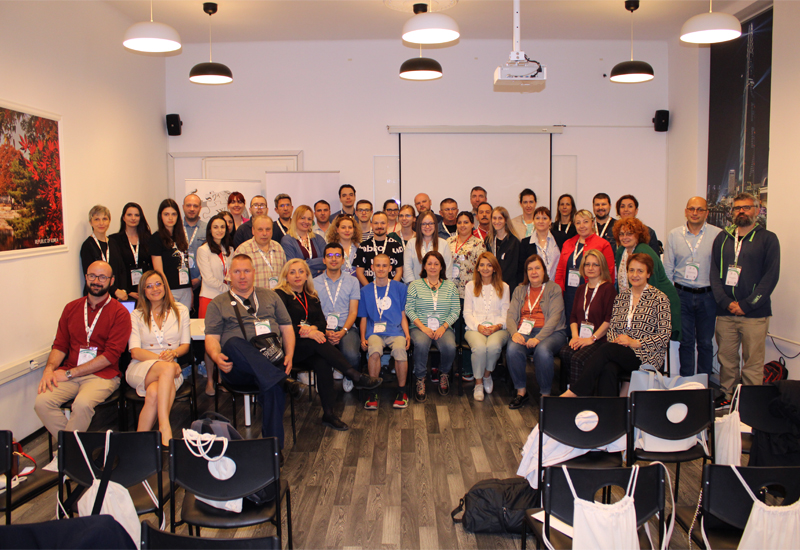The Wikimedia Serbia Association has stood out on the Neprofitne.rs transparency assessment platform for some time as an example of good practice in improving and maintaining the trust of its community.
Among the organizations that have received one of the three badges confirming the level of transparency of their work, they have achieved the highest "distinction": the blue badge. As holders of this certificate that they carry out their activities completely transparently, their team also diligently fills out their profile and provides the public with details about their work, projects and changes that they achieve through valuable and daily efforts.
In this way, as their team explains, they present themselves as responsible initiators of change when it comes to spreading free knowledge in Serbia, which helps them to strengthen a good impression on potential partners and collaborators.

Levels of transparency on Neprofitne.rs
That's why we asked Bojan Cvetanović, manager of the Wikimedia Serbia office, what is the importance of the Neprofitne.rs platform for their work, how important is up-to-date data, and, most importantly, the willingness to value the trust of their supporters.
What motivates you to regularly update your data on Neprofitne.rs?
Bojan: Primarily because we want to comply with the Law on Associations of the Republic of Serbia and the fact that through the Statute we have defined the work of our association as public and we do not want it to be just a letter on paper. Our program and financial reports, budgets, collaborations we achieve, names of members of the Board of Directors, rules, and policies are fully visible on our website.
Of course, the fact that there is a platform like Neprofitne.rs additionally enables us to present ourselves as an organization that is completely transparent. That is why, since the creation of the profile, we regularly update our data every year so that people interested in the work of our association are up to date.
Have you experienced the benefits of being transparent with your community?
Bojan: The community, or at least those members of the community who want to be better acquainted with our work, I believe that they certainly appreciate the availability of information related to our programs and activities. Thanks to this, the trust, security, and motivation of people to get involved in the story of spreading free knowledge in the Serbian language through work on Wikimedia projects grows.

Bojan Cvetanovic
What are your impressions of the platform? What could be improved?
Bojan: Mostly positive. The platform is extremely transparent and allows organizations to describe their programs and achievements in addition to basic data and financial reports. Since the platform is relatively young and is constantly being improved, bugs (errors) inevitably occur.
So it happened to us on one occasion that the data entered for one program, after the update, were automatically transferred to the others. But the good thing is that the support team reacts immediately to reports of such errors, and the error is quickly corrected.
Why should every nonprofit organization have its own profile on that platform?
Bojan: Because of respecting the principle of transparency and building trust towards the nonprofit sector, which is quite damaged in Serbia. Of course, the fact that we live in a country where trust in everything, including state institutions that are supposed to protect citizens, has been shaken plays a big role here.
In our country, the work of many organizations is invisible to the public, and the website of the Agency for Business Registers is complex and provides only basic information. If we have the opportunity to show our work, our programs, and our results somewhere, completely free of charge, we should embrace that chance. Also, thanks to the cooperation with the Catalyst Balkans team, which regulates the platform, we had the opportunity to attend free pieces of training intended for nonprofit organizations.
For what purposes do you use your profile — to promote your work, as an easily accessible database, or something else?
Bojan: To begin with, it's there to better inform the public about who we are. We are aware that when someone types "Wikimedia Serbia" in the Google search field, one of the results on the first page will most likely be our profile on Neprofitne.rs. We often sent a link to our profile to potential partners as another reference for insight into our work.
It is not a rare case that for the purposes of verification of our association we are on some other platforms abroad or e.g. to obtain an SSL certificate for our website, we had to send information about ourselves from other sources. Since the data on the website of the Agency for Business Registers is exclusively in Cyrillic, and therefore more difficult to understand in countries that use the Latin alphabet, the profile on Neprofitne.rs turned out to be a perfect hit in those situations.
How do you advise other organizations to improve their social responsibility?
Bojan: Behave in a way you would like others to treat you. Think about what you would like a partner organization to look like with which you will go to achieve your goals and apply it in your work. Be such that people have confidence in you, be socially responsible, and don't forget that this does not only mean carrying out some humanitarian or socially beneficial actions, but also respecting employees, partners, suppliers, and minorities.
I also understand that nonprofit organizations are often conditioned by the demands of their donors, so this advice also goes to those who are in a position of power and enjoy certain privileges in society.


Leave a comment